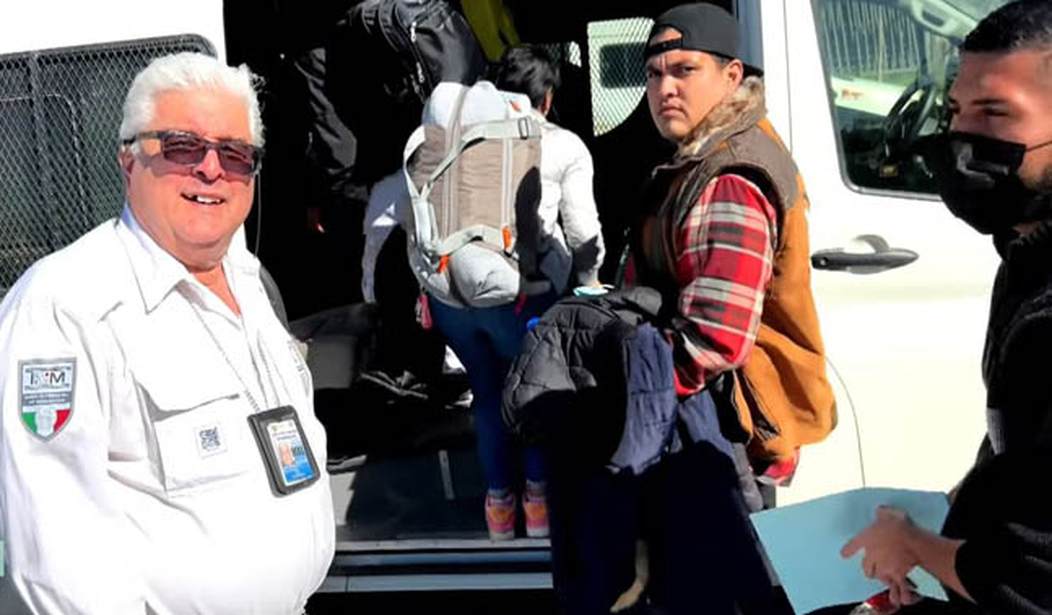According to the Center for Immigration Studies America and Mexico are cooperating on a new process for dealing with migrants, one which DHS hasn’t publicized. In September, American officials asked Mexican officials to help them bring down the number of border crossings by pre-arranging humanitarian parole for hundreds of people a day and then driving them across the border where they were handed off to American officials.
…representatives of Biden’s DHS called Mexicali’s mayor in September 2022 with a “favor” to ask. At the time, hundreds of thousands of people were passing through the region to illegally cross through a gap left in the border wall in Yuma, Ariz., because of President Biden’s order to halt construction. That drew significant media attention two months before the U.S. mid-term elections with races in Arizona mattering for control of the Congress.
“They needed to open a new entrance right here, and they needed someone to run it,” said Aaron Gomez, chosen to administer the new government shelter where final departure arrangements are made. “It was a favor the Americans asked for with this program.”
The Americans explained they saw the new Mexicali “entrance” as a way to improve immigrant safety.
“They’re going to cross either way. This will keep them from getting hurt,” Gomez recounted the Americans explaining.
This process has now expanded to a number of cities along the border and CIS suggests it looks like this might be something the Biden administration is embracing more broadly. The Biden administration has granted humanitarian parole to over a million people in the past two years but those were people who’d crossed the border and then claimed asylum. Now the Biden administration is arranging it so migrants don’t even have to cross the border, just agree to wait in Mexico at an approved shelter for a few weeks and you can get a ride across in a van.
In the past, there were limits on what constituted grounds for humanitarian parole but those limits have been changed.
CBP is taking handoffs of regular Mexican citizens and giving them humanitarian parole. Providing such benefit to Mexicans is extremely unusual.
In fact, the majority of the 25 people CIS saw driven to a legal crossing on November 4 were Mexican citizens from the states of Jalisco, Michoacán, and Oaxaca. These men and women staked their applications to a recent spate of cartel violence in Baja and Sonora. But American asylum judges have always uniformly rejected Mexican citizen claims of cartel violence for asylum on grounds that they can find safe haven elsewhere inside Mexico, and Border Patrol routinely pushes back single Mexican men into Mexico under Title 42.
No matter; all of these Mexicans were approved for humanitarian parole because they lived in areas of cartel violence.
CBP is also granting humanitarian parole on grounds of family reunification, something it generally did not do in the past. A CIS fellow argued there was a reason this wasn’t being publicized. It’s legality is questionable at best. “If these accounts are true, the United States government is acting directly in conflict with the limits and procedures established under federal law,” Elizabeth Jacobs said. But while the new program isn’t widely known in the United States, word is spreading quickly to other migrants. The facility in Mexicali which CIS visited is now building a newer facility which will be three times larger than the current one.
According to one shelter operator, American activists are helping migrants to game the new system by telling them what to say and even helping them generate the proof needed to make a claim:
…the U.S. wants “proof” of psychological trauma for humanitarian parole, so the human rights non-profits provide psychologists to conduct assessments and provide written recommendations for the parole.
If applicants claim they’re fleeing danger, university law professors and students help them file police reports over the phone to home countries after the fact, then get the police reports sent back as “evidence,” three shelter managers confirmed. If immigrants want in on a claim of urgent medical need, the non-profits provide the doctors to attest to their desperate straits.
But two of the shelter managers said the system is easily and frequently gamed with the assistance of these volunteers who are not concerned about truthfulness. He said he believes many of the applicants say whatever they’re told will get them over the line.
There are also stories circulating that fraud is becoming part of the process.
Worse than the lying and deceit on documents, Pastor Rivera said, is that the system now appears to be giving rise to corruption.
Immigrants tell him Tijuana city officials are demanding bribes of 5,000 to 10,000 pesos ($250 to $500) for them to get put on government shelter lists for faster and more guaranteed American crossings.
CIS put together this video describing the new process.








Join the conversation as a VIP Member